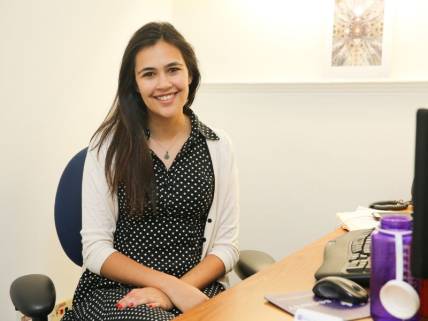Student Spotlight: Sita Goetschius (MPA 2023)

Serving as the engagement director for the Wagner Diversity Council (WDC), Sita works to ensure that all students feel welcome and foster opportunities for intentional discourse, practice, and action around diversity and inclusion.
What motivated you to attend the Wagner School of Public Service?
I was motivated to attend Wagner because I wanted to think about issues on a systematic scale. Wagner has a top-tier public policy specialization, and I was attracted to its focus on public policy within the context of serving New York City. I’ve loved working in education and supporting fellow students from marginalized communities navigate the complexity of the admissions process. However, it’s become so clear to me that so many of the barriers go beyond the individual institutions themselves, and exist due to policy choices. Wagner gave me the framework and toolkit to think critically about solutions through the lens of serving the public.
Capstone is the culmination of the Wagner journey, allowing students to apply what they’ve learned. Can you share a bit about your project and how it connects to your specialization?
My capstone project is a quantitative project using data from the Princeton University Eviction Lab. Our group was particularly interested in the connection between labor policy, such as Right To Work, and eviction filing rates. Unlike a client capstone, our group obtained the data, cleaned it, prepared it for analysis, and developed regression models to answer our research question. I knew going into Wagner that I wanted to build my quantitative analysis skills, and this project gives me hands-on experience in addressing the challenges of working with datasets in the real world. My groupmates, Monica Millay, Joe Speer, and Jingyi Yuan are such a smart and fun group of people to work with. I’ve learned so much about the research process and look forward to learning more.
You are on the board of the Wagner Diversity Council (WDC), a student-led group which works to ensure that all students feel welcome and supported at NYU. What are the benefits of getting involved in WDC?
The biggest benefit of being involved with the Wagner Diversity Council is the community. I started Wagner in January 2020, about six weeks before we went online. WDC was a lifeline to build community in a time of worldwide isolation. We all care about Wagner and the role of systematic racism in our various policy interests, so we have a strong base for building community.
WDC hosted its annual Powering Structural Change Conference in March. What do you hope people take away from the conference series? Any events you are especially proud of / excited about?
We named our conference very intentionally for the Wagner community. We’re not just observers of the world, we are all in or going to be in major institutions that shape our world. A Wagner education grants a certain kind of privilege to be seen as an expert in public service, and we want the conference to be a place where the community reflects on their role to make the changes they want to see happen.
What I’ve loved about this conference two years in a row is how nuanced all of the conversations are. As policy practitioners, the Wagner community is very solution-oriented, which really grounds the conversation into reality. No one shies away from asking the difficult questions, because we know that we have to address them to actually create meaningful change. I was particularly excited about the panel the Wagner Education Network organized– through the lenses of teachers and professionals that recruit teachers, the panel explored the very real challenges facing students and teachers of color, as well as possible paths forward to address the challenges.